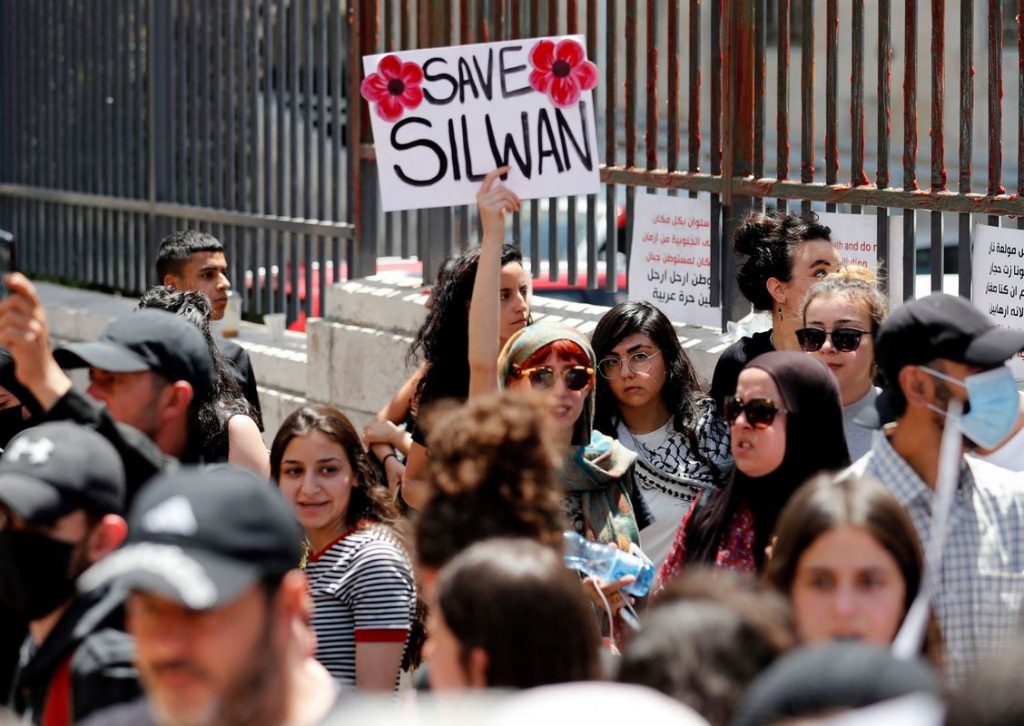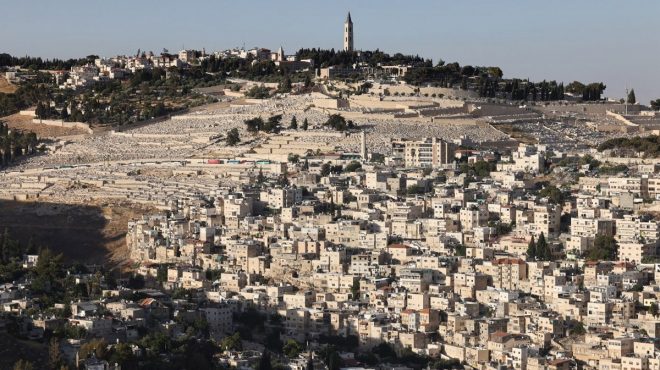More than 100 buildings housing about 1,500 people in the al-Bustan area of Silwan in occupied East Jerusalem faces demolition.
Nearly 120 Palestinian families face the destruction of their homes to make way for an Israeli religious theme park where the Israelis believe King David had a garden in biblical times.
About 1,500 people living in more than 100 buildings in the al-Bustan area of Silwan in occupied East Jerusalem are under threat.
On Monday, Jerusalem Municipality inspectors, accompanied by Israeli forces, delivered notices to demolish at least 13 of those homes and structures within 21 days, after an Israeli court ruled earlier they had been constructed without building permits.
“Stating that the orders were delivered is somewhat inaccurate,” said social activist Angela Godfrey-Goldstein, the co-director of the Jahalin Solidarity organisation.
“When inspectors deliver orders to Palestinians, they don’t give them in person or even affix them to the relevant doors despite the notices saying ‘demolition within 21-days of receipt’,” Godfrey-Goldstein said.
The notices were often not received, blow away and are sometimes found on the ground, she said.
“Hence, many Palestinians only know their houses are about to be demolished when they wake up to the sound of doors being bashed in or the day before when inspectors come to photograph their target,” explained Goldfrey-Goldstein, a former member of the Israeli Committee Against Home Demolitions, which fights the destruction of Palestinian homes in the Israeli occupied territories.
The Jerusalem Municipality very seldom approves Palestinian building permits in its continuing effort to Judaise the eastern sector of the city which includes facilitating illegal Jewish settlement building, the forced expulsion of Palestinian residents to make way for Jewish settlers and the planned destruction of hundreds of Palestinian homes.
Jerusalem deputy mayors Arieh King and Fleur Hassan-Nahoum are on record recently confirming that the aim of the state was to limit Palestinian construction in East Jerusalem as a deliberate policy that favoured Jews to protect Israel’s character, saying Israel was a Jewish state.
Three generations, more than 30 people, live in the homes of Fakhri Abu Diab and his brother, Nader Abu Diab. Nader’s building is listed to be demolished within the next few weeks.
The families’ appeals against the 2019 Israeli court decision authorising the demolitions were dismissed in 2020. Orders to proceed were issued in March of this year and the final notice was delivered on Monday.
“My family has lived in this home for decades, long before Israel occupied East Jerusalem,” said Fakhri Abu Diab, an accountant by profession and a spokesman for the Silwan Land Defense Committee.
“When I got married in 1988, I tried for nearly three years to get a building permit to enlarge my home as my family expanded.
“I went dozens of times to Jerusalem Municipality, sometimes accompanied by a lawyer and an engineer, but I was repeatedly told that building permits would not be issued for al-Bustan as it was to be turned into a Jewish theme park,” Abu Diab said.

‘No concrete action’
He said he had been involved in numerous appeals to foreign diplomats, NGOs, the United Nations and journalists for help in order to prevent the families from being made homeless.
“The French and American diplomats told me they would put pressure on the Israeli government not to proceed with the demolitions, which the French said broke international law.
“We get lots of verbal support, but no concrete action. Where is the UN, where is the international community? We desperately need international intervention now before the demolitions take place, not afterwards when we are already on the streets and are then given tents and food by aid organisations,” said Abu Diab.
The Jerusalem Municipality’s plan to build Gan Hamelech (King’s Garden) Park on al-Bustan’s land, and to link it to the nearby City of David, is only part of the Judaisation story that applies to all of the Israeli-occupied West Bank, specifically Area C, comprising 60 percent of the territory
“In April, the Israeli authorities demolished, forced people to demolish, or seized 23 Palestinian-owned structures across the West Bank, including East Jerusalem,” said the UN Office for the Coordination of Humanitarian Affairs (OCHA) in its May report.
“All the structures were in Area C of East Jerusalem and were targeted due to a lack of building permits, which are nearly impossible for Palestinians to obtain.”
In April, OCHA reported on the numerous demolitions in March, which, as well as Palestinian family homes, included buildings that housed or were supported by NGOs. Sixteen structures that were demolished were initially funded by international humanitarian donations, while another 29 donor-funded structures, valued at nearly 86,000 euros ($105,000), were served demolition orders.
“One of Israel’s major long-term goals in Jerusalem is transforming the Old City Basin from what it is today – a dense Palestinian urban area, which is also the place of some of the most holy sites to the three Abrahamic religions – to one where Jewish nationalistic and religious identity is dominant above all,” Aviv Tatarsky, a researcher from the Israeli Ir Amim NGO, wrote in the Jerusalem Post.
“For this purpose, the Israeli government – aided by settler organisations – is evicting Palestinian families in neighbourhoods such as Silwan and Sheikh Jarrah.”
‘Nowhere else to go’
While Abu Diab’s entire home will be demolished, the second floor of his brother Nader’s family home is also to be destroyed.
Like Fakhri, when Nader got married he too built on additional rooms after failing to get a building permit.
The immaculate home, constructed in the overcrowded and poverty-stricken neighbourhood, was obviously built with pride with each added room tastefully decorated. But as the countdown towards the demolition of their homes closes in, Nader’s wife Itedal fought back tears.
“I’m afraid for my children and grandchildren,” she calmly said, despite her obvious despair.
When asked if she had started to pack and move her things after receiving the demolition notice, Itedal said she was too traumatised to start packing – and neither was she prepared to leave.
“I’ve lived in this house for 37 years. We have nowhere else to go.”
Fakhri Abu Diab added the Israeli actions were aimed at more than just leaving Palestinians homeless.
“They are trying to destroy our culture, our way of life and our hope for the future.”
Godfrey-Goldstein said rather than searching for peace with the Palestinians, the Israelis were doing the opposite.
“Instead, we are teaching people to hate us.”
 Alghadeer TV Alghadeer TV
Alghadeer TV Alghadeer TV

